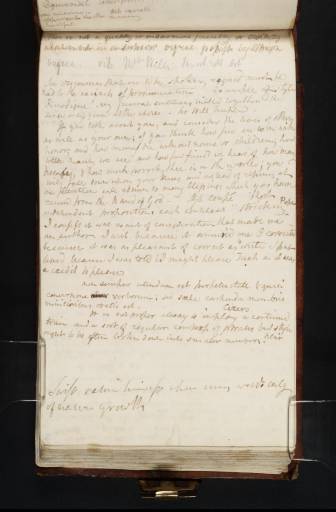Joseph Mallord William Turner Notes on Grammar, &c (Inscriptions by Turner) 1808
Joseph Mallord William Turner,
Notes on Grammar, &c (Inscriptions by Turner)
1808
Joseph Mallord William Turner 1775–1851
Folio 70 Verso:
Notes on Grammar, &c (Inscriptions by Turner) 1808
D07213
Turner Bequest CVI 67a
Turner Bequest CVI 67a
Inscribed by Turner in ink and pencil (see main catalogue entry) on white wove paper, 185 x 108 mm
Accepted by the nation as part of the Turner Bequest 1856
References
1909
A.J. Finberg, A Complete Inventory of the Drawings of the Turner Bequest, London 1909, vol.I, p.283, CVI 67a.
1990
Andrew Wilton and Rosalind Mallord Turner, Painting and Poetry: Turner’s ‘Verse Book’ and his Work of 1804–1812, exhibition catalogue, Tate Gallery, London 1990, p.15, where said to occur in the Cockermouth sketchbook (D07537–D07592; D40744–D40745; Turner Bequest CX).
2001
James Hamilton, ‘Wells, William Frederick (1762–1836)’, in Evelyn Joll, Martin Butlin and Luke Herrmann eds., The Oxford Companion to J.M.W. Turner, Oxford 2001, pp.375–6.
Turner’s inscriptions (of which only the first seven lines were transcribed by Finberg) read:
[in ink and pencil] There is not a quality or endowment, faculty or ability | which is not in a superior degree possesst by women. | [in pencil] Vide Mrs Wells. Knockholt, Oct.
[in ink] In discourses that are to be spoken, regard must be | had to the easiness of pronunciation. Example of style.| Periodique – viz. – several sentences linked together, the | sense only given at the close. Sir Will. Temple | If you look about you, and consider the lives of others | as well as your own; if you think how few are born with | honor, and how many die without name or children; how | little beauty we see and how few friends he hear of how many | disasters, & how much poverty there is in the world; you | will fall down upon your knees and instead of repining at | one affliction will admire so many blessings which you have | receivd from the hand of God
Style coupe short | independent proposition, each compleat. [Pope inserted] Stricking (?)| I confess it was want of consideration that made me | an author. I writ because it amus’d me I corrected | because it was as pleasant to correct as write I pub|lished I was told it might please such it was | a credit to please
Non semper intendum est perpetuitate & quasi | conversione verborum; sed saepe carpenda membris | minitioribus oratio est
Cicero
Cicero
It is not proper always to employ a continued | train and a sort of regular compass of phrases but style | ought to be often broken down into smaller numbers. Blair
Swift valued himself upon using words only | of native growth
Most of these observations are copied or summarised from Hugh Blair’s Lectures on Rhetoric and Belles-Lettres (1783 and subsequent editions); see note to folio 69 verso of this sketchbook (D07211; Turner Bequest CVI 66a). The two longer passages with their several quotations from Sir William Temple (his Letter to Lady Essex), Alexander Pope and Cicero are derived from Lecture XI, on ‘Structure of Sentences’, while the remark on Jonathan Swift’s avoidance of words of foreign origin comes from Lecture X, on ‘Style – Perspicuity and Precision’.
The first example of a sentence given here, on the superior qualities of women, reminds Turner of Mary Wells, late wife of his friend and colleague William Frederick Wells, who had died in 1807. The association of ideas is particularly interesting as Wells had prompted Turner to begin working on his Liber Studiorum at Knockholt in 1806, while Blair’s division of poetry into categories such as Pastoral and Epic in his Lectures may have helped inspire Turner’s similar classification of landscape imagery in the Liber.1
David Blayney Brown
Julky 2010
Julky 2010
Wilton and Mallord Turner 1990, p.15; Gillian Forrester, Turner’s ‘Drawing Book’: The Liber Studiorum, exhibition catalogue, Tate Gallery, London 1996, p.30. Forrester follows Wilton in ascribing Turner’s notes from Blair to the Cockermouth sketchbook (Tate D07537–D07592; D40744–D40745; Turner Bequest CX).
How to cite
‘Notes on Grammar, &c (Inscriptions by Turner) 1808 by Joseph Mallord William Turner’, catalogue entry, in David Blayney Brown (ed.), J.M.W. Turner: Sketchbooks, Drawings and Watercolours, Tate Research Publication, December 2012, https://www

